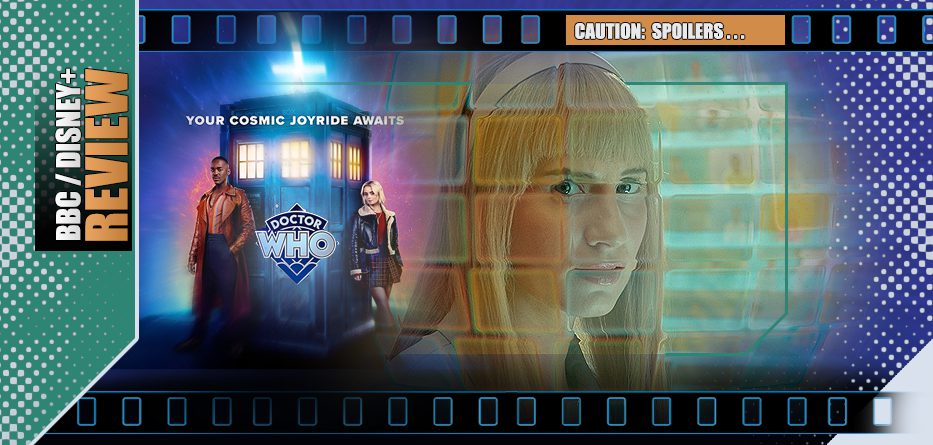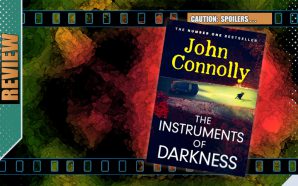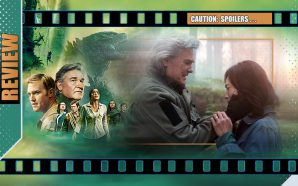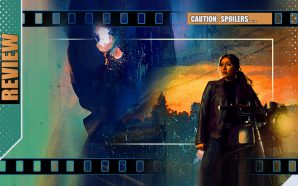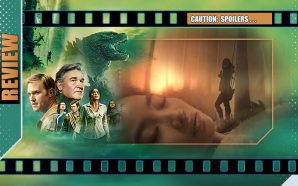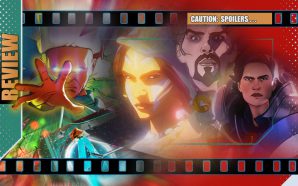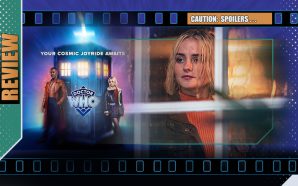OMG! Lindy Pepper-Bean is like having the most SO awesome day – minimal work, chatting with friends, exchanging beauty tips and listening to the coolest music. It’s like, totally, great. But…ick… who’s this Doctor fellow person trying to gatecrash her chatroom – he doesn’t look like any of her cool friends…and why is there a survey-taker called Ruby that is telling Lindy to switch off her ‘bubble’ device and look to her right? Ewwww, this that like a really big insect that’s eating her workmates?
Now this day, like, TOTALLY sucks… suddenly, Lindy is having to run for her life and she can barely remember how to walk. Can this annoying Doctor guy guide her to safety and will pop-star Ricky September be able to take her the rest of the way? Is there any escape from Finetime when there’s real bugs in the system?
*spoilers*
Ahead of broadcast there was a feeling that this would be Davies’ take on the dangers of social-media, perhaps his own post-modern spin on the subversive contentment seen in Sylvester McCoy-era The Happiness Patrol, but with a more 21st century veneer and shiny VFX. And, yes, there’s definitely a feeling through much of the episode that this is going to be another thinly-cloaked metaphor for which Doctor Who has a mixed record – sometimes exceptional, sometimes heavy-handed. The amount of time that people spend on social-media (particularly young people) is more topical than ever, with information beamed at almost light-speed across the globe but often to an audience who seem content with the delivery system rather than the small-print accuracy and as long as they don’t have to do the mental heavy-lifting and due diligence. From the outset of this week’s story there’s an arched-eyebrow and a dismissive, pastel-pale palette of indifference to proceedings – the idea of deliberately-distracted people being so obsessed with their online presence that they can’t see the dangers around them. Early word was that Dot and Bubble was going to be a very Black Mirror episode (the subversive series created by Charlie Booker with a thematic throughline dealing with the pros and cons of technology) but with a more family-friendly tone befitting Doctor Who.
For much of the running time, that’s what we get. It’s a mixture of overtly-pointed satire and more traditional scary monsters. The human populace are deliberately bland young people, known only by their on-screen handles, required to do two hours of work a day and then merely mix in virtual chatrooms and completely oblivious to the danger they may be in from creatures that devour some of them when the time is right. Anything that threatens the status-quo is simply ignored or ‘blocked’, often by the system-users as much as the quiet creatures that hover just beyond their field of vision. The giant woodlice like creatures that stalk the rooms, hallways and plazas of the Finetime city bear a resemblance to something the classic series might have given us on a good day – and might have been more effective if nightmarishly glimpsed rather than fully-featured… but as it turns out, they may not be the biggest monsters in the city.
In some ways this is yet another example of the show coming up with ways to spread its central dynamic duo more thinly, something that has been quite apparent in the first half of the eight-part season, which is perhaps not what you need for a major relaunch – though classic ‘Nu-Who’ episodes like Blink were certainly not hurt by such a decision. (Gatwa had duties on Sex Education to complete, but it makes one wonder if the series couldn’t have delayed production a little to prevent such absences in his inaugural run). One also wonders how the episode might have differed with the Tardis duo more ‘in the mix’. There’s some running involved in the episode, but a good deal of the running-time involves characters simply talking to camera – again, not dissimilar to aspects of Blink. Callie Cooke essays the central character of the story, Lindy Pepper-Bean, a Finetime user who resents the appearance of two people not in her friends account and their bizarre warnings of imminent peril and a good 90% of the episode only involves Gatwa and Gibson appearing in tight, individual poses, little more than earnest webcam avatars caught somewhere between facebook, instagram, tiktok and countless other social media platforms.
But there’s some wrong-footing going on here. We’re asked to root for Lindy as she clumsily tries to escape her fate, but it sways into outright pity and touches of disdain as we realise she’s so ineffectual that she can barely walk in a straight-line without having her ‘bubble’ dictate directions to go. She’s an airhead, a 2D personality in a world struggling for that third dimension. And that might have been a criticism to level at even an enjoyable, but predictable episode if that’s all there was: the tale of a too-secure princess in an ivory tower who must escape a threat she’s not equipped to tackle… which is where the Doctor usually comes in to set things straight. But Davies decides to make this tale of a sterile metropolis and its ignorant inhabitants more cynical as we move forward.
While the last five minutes of last week’s 73 Yards handwaveringly undermined and sabotaged the strong acting and moodiness that had been on show in the preceding forty minutes (with absolutely no sense of logic), the opposite is true here with the last few minutes of Dot and Bubble being the most powerful. Lindy, it turns out, is not a person we should be rooting for at all. In his many travels, the Doctor has done almost anything and everything he can to save people from monstrous threats to their well-being (and even says so in such specific terms in this episode) but here he’s faced with such rank stupidity, vanity and self-centredness of Lindy and her few surviving chat-room partners that all he can do is watch the survivors head off to their own assured destruction as they wave away his overtures of sanctuary and rescue, convinced of their own superiority, the sort of people who wouldn’t be out of place on the Golgafrinchan starship from The Hitch-hikers Guide to the Galaxy and generate as much final sympathy as most of the morality-free candidates in the running to take over a chocolate factory.
Gatwa’s flamboyant swirling-dervish of an interpretation might not be to everyone’s tastes but so far he’s successfully channeling many of the Time Lord’s key traits. It’s clear that his version has shrugged off some of the weight of the Tennant incarnations and he is out to have fun in the universe, but he’s feeling everything at an amped-up level – and that sometimes includes the bittersweet and disappointment aspect of his encounters and adventures. Lindy – who has proven herself to be the anti-companion, the antithesis of what the Doctor looks for in decency by the way she secretly sacrifices the story’s only real and unlikely hero Ricky September (Tom Rhys Harries) to save herself – looks at the Doctor with such scorn and disdain (and the mention of him being a ‘not one of us … screen to screen contact is just about acceptable but in person, impossible‘) that it’s only afterwards that you realise that Gatwa is the only black actor in the entire episode and that the young people of Finetime are all privileged, self-obsessed white people who look down on both him and the middle-class Ruby for reasons that are quietly chilling. The thinking may not have been quite as overt as that in the writing (though one suspects Davies knew exactly what he was inferring), but if the same-skin-colour is just mere coincidence, the on-the-nose but not over-hammered script speaks as much to the dangerous ideas of innate privilege, class-structure and casual ignorance. There’s little doubt by the end of proceedings that the real villains of the piece are not so much the sluggish ‘Mantrappers’ that are eating the Finetimers (the beasties’ origin and initial threat to both Finetime and the Homeworld is conveniently vague), but the wastes-of-air that care so little for anything outside their own personal sphere (literally).
Actor Susan Twist makes another appearance – here in a recording of Lindy’s mother – with both the Doctor and Ruby remarking that she seems familiar (how long will it take this thread to play out?)
The episodes to date have been mixed, but Dot and Bubble‘s ending is made all the more dark and cynical because pre-publicity indicated a different tone and many fans may have expected this to be a lightweight entry to match its palette. A fairly family-orientated episode, an adventure with a morality-tale, suddenly gets a far bleaker ending, giving the story some actual bite and with no easy answers. It’s not perfect, but while this would be a worryingly cynical turn if it was the tone of every episode, this feels like Davies delivered on his return to Doctor Who, being simultaneously funny, frivolous but also deeply effective when it gets the balance just right.
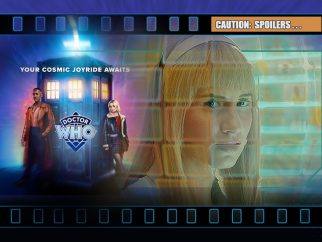
- Story8
- Acting8
- Direction8
- Production Design/VFX8

